► CAR runs a 40kWh Nissan Leaf
► What’s the EV like to live with?
► We spend 10 months with the Leaf
Month 10 of our Nissan Leaf long-term test: the end verdict is in
With increasing rarity a car will come along delivering such a knockout punch in one specific area that it completely recalibrates your clemency counter, and you find yourself forgiving it for all its other shortcomings and foibles. Nissan’s new Leaf did that to me. Quite unexpectedly, too.
Before it arrived I was thoroughly ambivalent about it, and the affordable electric revolution it spearheaded. There were the unfounded but pervasive concerns that it would slowly whirr to a silent halt at the most inopportune time and in the most inopportune location possible. There was all that faff with the army of smartphone apps and online accounts required to charge on the fly. A cursory glance at a sparsely-populated charger location map wasn’t exactly confidence-inspiring. All this – not to mention that it looked gawky – almost sealed the Leaf’s fate before I drove it. How wrong I was.
It took just a month and 1000 miles to realise my mistake. I recall with clarity parking up at home after returning from Weybridge – a 140 mile trip undertaken at get-a-serious-wiggle-on-or-we’re-going-to-be-late pace – and realising I’d not given a second through to the Leaf’s range. I enjoyed its warm pre-heated cabin when I set off. I saw off a couple of surprised tailgating BMWs and Audis on some fast A-roads. I loved the superb Bose sound system. I found its silent and smooth driving characteristic incredibly relaxing. And the best bit was working out that electricity for the trip cost me just over a fiver. The price of two cups of coffee. I realised I was riding on the cusp of what will soon be the new normal for many drivers – and I was thoroughly enjoying the journey into the future.
It helped a great deal that, as a family, we ran the Leaf almost exactly as Nissan’s engineers intended. It was used every day for all our regular trips – the school runs, shopping, weekend drives to family and friends – which it handled without missing a beat. It was parked on the drive and charged overnight using our home-charging Chargemaster wallbox, ready for action the next day.
How much does it cost to charge an electric car?
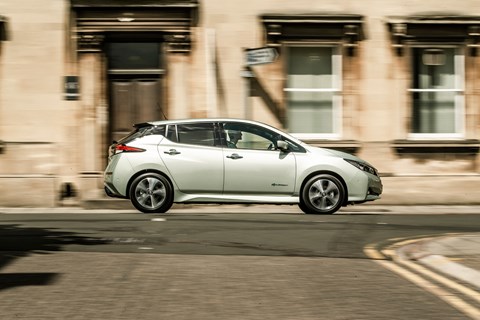
I didn’t visit a service station for five months, adding up to a lot of time saved. My wife and daughters loved the Nissan, too, to the point where we’re about to take the plunge and buy a used Leaf ourselves.
Our full Nissan Leaf review: we test the latest EV
We were lucky enough to have a second car – our trusty diesel Seat Altea – to fall back on should we need to travel halfway across the country. But trekking further afield wasn’t the logistical nightmare I anticipated. There were only a dozen times that I recharged while out and about, and five minutes of pre-drive planning ensured I was able to juice up the batteries over a coffee. Only once did I have to limp 10 miles further down the road to another charge point on will-it-won’t-it zero range, and that was because I made the foolish decision to trust Charge Your Car’s abysmal app. Never again.
Nissan’s own mobility app left a great deal to be desired, to be fair. It was slow, recalcitrant and clunky, and it was only a major software update mid-way through the Leaf’s stay with us that put it on the right side of decent. It was one of many irritations that I’ve detailed in previous reports, but in truth, they mattered very little. The Leaf felt significant. And it’s been a very long time since I felt that about a car.
By Ben Whitworth
The best electric cars and EVs on sale
Britain’s finest hybrid cars and plug-ins
Logbook: Nissan Leaf Tekna 40kWh
Price £28,390 (£30,055 as tested)
Performance 148bhp e-motor and 40kWh battery, 7.9sec 0-62mph, 90mph
Efficiency 206W/km, 0g/km CO2
Energy costs 3.6p per mile
Miles this month 1183
Total miles 10,458
Counting the cost: Nissan Leaf depreciation
Cost new £30,055
Private sale £24,353
Part-exchange £22,858
Cost per mile 3.6p
Cost per mile including depreciation 72p
Month 9 living with a Nissan Leaf: it’s genius, in parts…
Cheap to live with
Get past its £30k price and the running costs are impressively modest. I cover 1100 miles a month in the Leaf which, at 3.6p per mile, adds up to £39.60. That’s the same that I pay each week to fuel our diesel Seat Altea. Over a year that’s a £1400 saving.
Not joined up
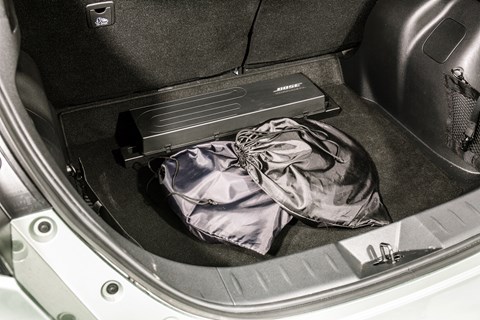
A Chargemaster wallbox at home means I’ve only had to deploy the Leaf’s own charging cables when out and about. What a palaver on a cold, rainy night. Vacuum cleaners have integrated cable retrieval features. Why not one of the world’s most advanced cars?
Urban legend
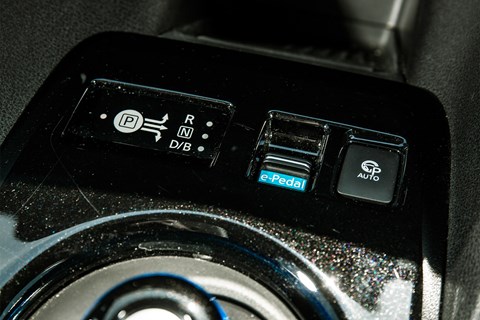
The Leaf is very relaxing to drive around town, helped by its B driving mode, which enhances regen braking so you rarely have to brake. In stop-start traffic the e-Pedal intuitively brings the car to a smooth stop as you come off the throttle. Clever, unlike sluggish Eco mode.
Not so smart
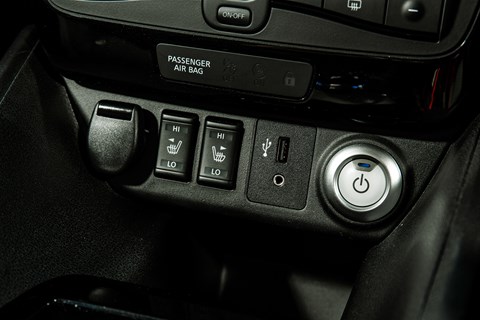
For an incredibly progressive car, the Leaf’s cabin exudes not one iota of technology-imbued sexiness. The heated seat buttons encapsulate this – hard shiny slabs of Primera-era plastic. And there’s just one USB port.
By Ben Whitworth
Logbook Nissan Leaf Tekna
Price £28,390*
As tested £30,055*
Engine 40kWh battery + electric motor, 148bhp @ 3283rpm, 236lb ft @ 0-3283rpm
Transmission Single-speed auto, front-wheel drive
Performance 7.9sec 0-62mph, 90mph, 0g/km CO2
Miles this month 1012
Total 9275
Efficiency 206Wh/m
Energy cost 3.6p
Month 8 living with a Nissan Leaf: more punctures!
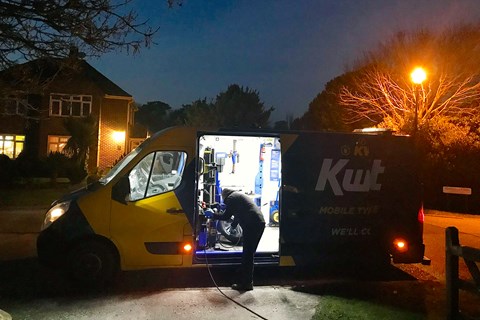
Last month I grumbled about the Leaf’s awful driving position. The list of irritants continues, I’m afraid.
The packaging is embarrassingly poor, and cabin space is modest at best. Above 60mph wind and tyre noise are intrusive. The connectivity app that was catastrophically bad has been upgraded – it’s now just acceptable. There’s only one USB port, the screen graphics are lousy and the sat-nav/infotainment system feels archaic – unimpressive for a car at the vanguard of modern mobility. The button-splattered dash and centre console are pure 1995. The automatic emergency braking is so hypersensitive and throws out the anchor the moment I enter a car park. The car bings and trills incessantly. It’s also frumpy, ungainly and inelegant.
And to cap it all off, I lost not one but two fresh tyres to punctures, both within weeks of each other. Fortunately Kwik Fit’s mobile service was able to source replacement Dunlops – but at £194 a pop, including fitting, it was an expensive month.
Don’t get me wrong, there is a great deal of good to be said about the Leaf, which we’ll come to next month. But hell, there’s a lot of disappointingly sub-standard stuff to wade through first.
By Ben Whitworth
Logbook Nissan Leaf Tekna
Price £28,390*
As tested £30,055*
Engine 40kWh battery + electric motor, 148bhp @ 3283rpm, 236lb ft @ 0-3283rpm
Transmission Single-speed auto, front-wheel drive
Performance 7.9sec 0-62mph, 90mph, 0g/km CO2
Miles this month 1099
Total 8263
Efficiency 370Wh/m
Energy cost 3.6p
Month 7 of our Nissan Leaf 40kWh long-term test: the interior’s not as clever as the rest of it
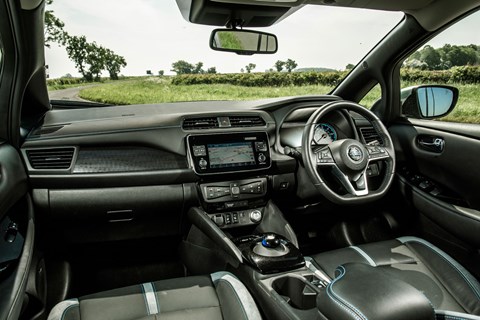
There are some excellent features and aspects of the Leaf, and there are some woeful ones, too. The driving position is appalling. Imagine teetering atop one of those lifeguard lookouts in an over-upholstered chair with a squab designed to push your face up against the windscreen. Now pretend you’re holding a steering wheel that sits far too close to the dash, but is only adjustable for rake.
Next, add a rakishly angled windscreen that positions the header rail at eyebrow height and the sun visor to within scraping distance of your forehead. And lob in some obese A-pillars and a huge rear-view mirror housing to severely limit forward visibility.
It’s a ground-breaking car piloted by a horribly uncomfortable driver.
By Ben Whitworth
Logbook Nissan Leaf Tekna
Price £28,390*
As tested £30,055*
Engine 40kWh battery + electric motor, 148bhp @ 3283rpm, 236lb ft @ 0-3283rpm
Transmission Single-speed auto, front-wheel drive
Performance 7.9sec 0-62mph, 90mph, 0g/km CO2
Miles this month 1278
Total 7164
Energy consumption 370Wh/m
Fuel this month £39.75
Extra costs None
* Prices including government grant
Month 6 living with a Nissan Leaf: a change of hands
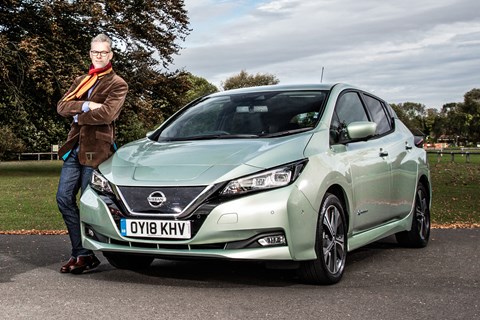
I’m thoroughly intrigued by the thought of life with a Leaf. So many questions to be answered during my six months with the electric Nissan. How will it cope with the daily demands of family transport? Will I enjoy driving this harbinger of our future? Will its design get any easier on the eye? And will my utterly car-mad Aston Martin-driving neighbour ever look me in the eye again?
Top of the to-do list ahead of meeting up with Jake and heading home in the Leaf was getting in touch with Chargemaster to arrange the installation of a domestic wall-mounted charger. Within four days of my initial call, a 7kW wall unit was mounted on my garage wall, at a cost of £295 alongside the government’s £500 OLEV grant.
Then I installed the best part of a dozen apps on my phone to allow me to communicate with both the Leaf and the UK’s bewildering array of electricity suppliers, each of which require the setting up an account and payment details. Imagine every conventional fuel station having different-shaped nozzles on their petrol and diesel dispensers that determined if you could refuel or not, and if you were lucky enough to be able to top up your tank, you then had to pay with a bank card specific to that fuel supplier…
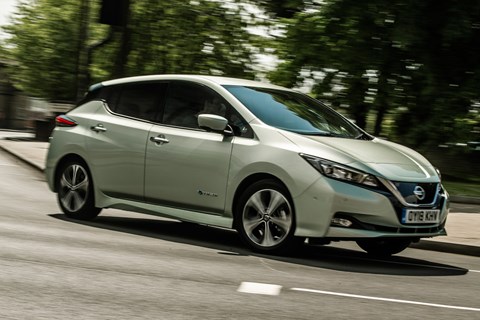
And then it was off to meet young Groves, who could barely believe his luck that he was swapping the Leaf for an Up GTI. The GTI is so him. Our meeting was a baptism of fire. We met near Egham in Surrey – a mutually convenient location – and when he arrived in the Leaf it had just 10 miles of charge remaining. The first charge station we tried – a Shell with a Geniepoint charger – wouldn’t recognise the Leaf, so we had to drive at a glacial pace six miles up the road to the charge station at the Windsor Lawn Tennis Club for an hour’s worth of 50kW CHAdeMO charge – sufficient for the 85-mile trip home.
During that drive it struck me that the rest of the Leaf lags some way behind its all-electric powertrain. Let’s see if that view changes over the next six months.
By Ben Whitworth
Logbook: Nissan Leaf Tekna
Price £28,390*
As tested £30,055**
Engine Electric motor, 148bhp @ 3283rpm, 236lb ft @ 0-3283rpm
Transmission Single-speed auto, front-wheel drive
Performance 7.9sec 0-62mph, 90mph, 168-mile range (WLTP claim), 0g/km CO2
Miles this month 911
Total 5886
Energy consumption 370Wh/mile
Fuel this month £28.33
Extra costs None
*Prices reduced by £2500 Plug-In Car Grant before November 2018 changes
Month 5 living with a Nissan Leaf: giving it a bootful
I’ve previously moaned about the amount of boot space eaten up by the amplifier for the Leaf’s energy-efficient Bose stereo system. But it works really well.
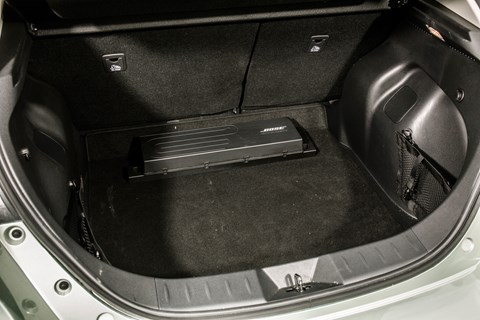
There’s plenty of flexibility, allowing for thumping bass or crystal-clear vocals – I just have to make sure I don’t blow out the windows. If only it had the Micra’s Personal Space headrest speakers.
After this report, the Leaf is going on to another keeper. I, meanwhile, will be slipping into something a little more tartan-ish.
By Jake Groves
Logbook: Nissan Leaf Tekna
Price £28,390*
As tested £30,055**
Engine Electric motor, 148bhp @ 3283rpm, 236lb ft @ 0-3283rpm
Transmission Single-speed auto, front-wheel drive
Performance 7.9sec 0-62mph, 90mph, 168-mile range (WLTP claim), 0g/km CO2
Miles this month 405
Total 4795
Energy consumption 370Wh/mile
Fuel this month £15.12
Extra costs None
*Prices reduced by £2500 Plug-In Car Grant before November 2018 changes
Month 4 living with a Nissan Leaf electric car: the EV charging infrastructure
Charging is less hassle than some make out, but still requires serious forethought and isn’t without hiccups. I’ve been using the Leaf for airport runs, swishing silently to Heathrow for some early-morning flights, quietly hoping that there will be a spare charging bay to leave the Leaf chowing down on some kilowatts in while I’m away. I left the Leaf at Heathrow T5’s short stay car park – it’s pricey, but it’s the only official car park with any EV charging stations, hosted by Pod Point. There are only four EV bays in the whole 3000-bay multi-storey, and none elsewhere within the terminal’s official car parks. Terminal 2 has 26, while T3 and T4 can both serve only four cars at a time, all in short-stay parking.
Anyway, I luckily nab a space, plug in, confirm the charge on the Pod Point app and head off to catch my flight. An hour later, just as I’m sitting down for take-off, the NissanConnect app notifies me of a ‘successful’ charge which has added just eight per cent, taking the battery up to 28% (around 40 miles). Not enough, as my journey home is 96 miles and that assumes there won’t be significant delays or roadwork diversions, and doesn’t factor in a heavy right foot. I had to hit ‘confirm charge’ four more times on the journey to make sure I had enough power to get back home on my return – not exactly stress-free.
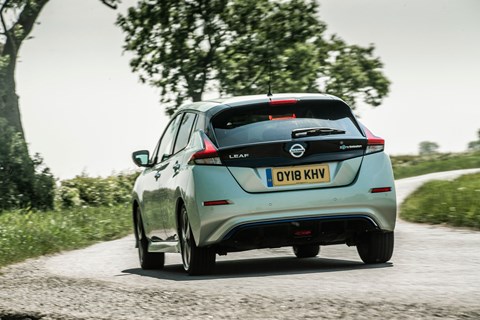
EVs should come with an advisory to ensure you’re handy with a smartphone. If you’re planning on making the switch, sign up for accounts on Ecotricity, Polar and Pod Point ahead of time on your smartphone. It’ll save you faff come charging time when plugging into one of the three biggest charging networks in the UK.
Zap-Map, the app that plots charge points and uses Waze-like crowd-sourcing to warn of non-functional or busy chargers, is a big help in staying ahead of the curve.
Plenty of EV users have used the app as a way of making their feelings known about the insufficient number of chargers at key spots such as airports, and now I know exactly what they’re talking about. The infrastructure is improving hugely, but there’s still quite a way to go.
By Jake Groves
Month 3 of our Nissan Leaf long-term test review: boot space and practicality
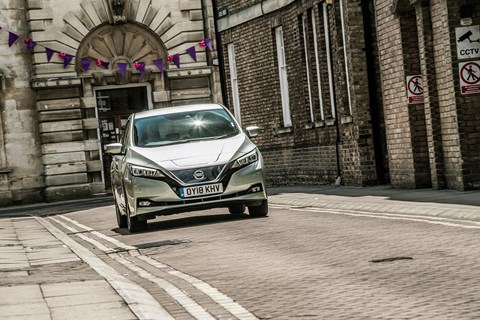
Let’s talk about the Leaf’s boot. It measures 435 litres, which is bigger than the likes of the Renault Zoe, VW e-Golf and Kia Soul EV. There are quite a few compromises to get that space, though; while there are handy bags for your charging cables and little nets to slot the bags in at the sides, the actual opening is really weirdly shaped – almost like a teardrop.
My colleague James Taylor, who borrowed the Leaf to drive to a guitar lesson, had a struggle getting his instrument to squeeze in, battling the pincer movement of the high load lip, the big Bose audio unit screwed to the boot floor and rear seatbacks that don’t quite fold flat.
I appreciate that making an EV comes with compromises, but when one is built from the ground up like our Nissan, surely practicality niggles should be few and far between?
By Jake Groves
Our picks: the best electric cars and EVs
Month 2 living with a Nissan Leaf electric car: punctures and spare wheels
Bang! Argh! Rumble, rumble, rumble. I’m not good at describing moments with onomatopoeia, but that’s pretty much what went down as I was merging onto a Peterborough ring road at about 60mph when my Leaf’s front right wheel met with a stray block of wood about the length and height of a railway sleeper in the middle of a dual carriageway, at rush hour.
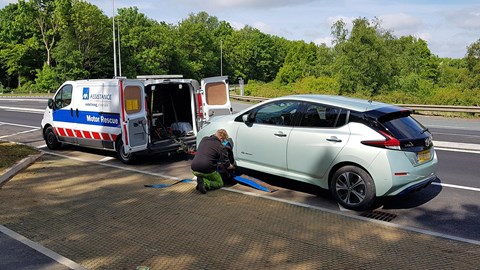
It was a massive hazard, and one that I hadn’t spotted until it was too late as I watched for traffic behind me while merging. I coasted the Leaf to a halt after hitting it, mounted the kerb to avoid adding to the hazards, and climbed out.
Before I could even reach for my phone, a police car had swooped in to close the road, but three cars had collided into each other trying to avoid the obstacle before it arrived. No injuries there, but I still counted myself lucky I came away from it only with a blown tyre. We were all guided to a nearby layby to await recovery.
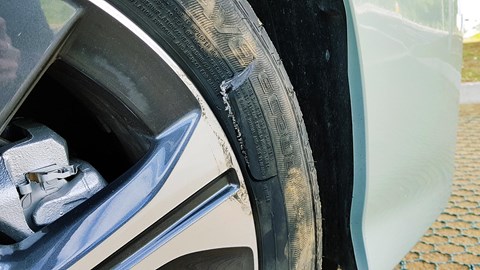
Assistance arrived two hours later and I was towed to Smiths Motor Group Nissan in Peterborough. Nissan UK claimed the tyre on the Leaf’s insurance (as Cambridgeshire Police provided an incident number, proving it wasn’t my fault) and three hours later the Leaf was returned sparkling clean, charged and fitted with a new Enasave EC300 eco tyre, like it never happened.
By Jake Groves
Month 1 of our Nissan Leaf long-term test review: the introduction
I can say with absolute certainty that I am the least-prepared person on the CAR team to run an electric car. Up until my new Leaf long-term test car had arrived, I had driven just two – CAR’s BMW i3 and Tesla Model S long-termers – in both cases for a short commute. I’ve got only the shakiest grasp on how the whole charging situation works, and in any case I don’t (yet) have the landlord’s permission to get a wallbox fitted for faster charging at home.
But how hard is it to live with one, really? This is the future, after all, whether some of us like it or not, so why not take up the challenge? In fact, EV-angelists will say there’s no challenge to it at all. I should, they say, be able to live with one with only minimal adjustment. And if I can, anyone can.
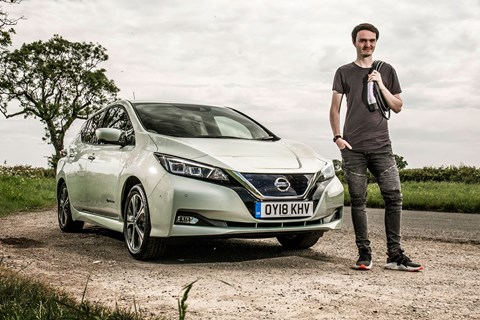
My zero-emissions weapon of choice, then, is the second-generation Nissan Leaf. The paint is called Spring Cloud, and the spec level is called Tekna. Spring Cloud looks terrible on Nissan’s online configurator – more like Stagnant Water – but better in the metal. This £575 option is in fact one of the biggest talking points about the car, if only because so many Leafs seem to be painted in Dishwasher White. Comments so far span everything from ‘I actually quite like that’ to ‘It doesn’t match the blue trimmings’ and ‘It’s a bit old person-y’. It’s growing on me; I’m just pleased it’s not a boring white or silver.
Tekna is the Leaf’s top spec level, and it has all the toys: Nissan’s ProPilot semi-autonomous driving tech, heated steering wheel, heated front and rear seats, automatic air-con, 360° parking aid and enough safety tech to rival Volvo. There’s a Bose stereo system in there, too, and while I know I can park, I’m glad I’ll have the opportunity to satisfy my curiosity about the ProPilot Remote Parking tech – a £1090 extra.
The first week behind the wheel has provided plenty of first impressions. The driver’s seat doesn’t go low enough for me so I feel like I’m perched up, and I have to duck under the rear-view mirror to be able to see around sharp left-hand corners. Plus, since I’m 6ft 3in, I have to slide the seat back quite a way – and that means the lack of reach adjustment makes the steering wheel a bit of a stretch, so I can’t fully get a comfortable driving position. The boot aperture is an odd shape and the (absolutely cracking) stereo’s chuffing great amp is bolted to the boot floor, so packing big things inside is a little awkward.
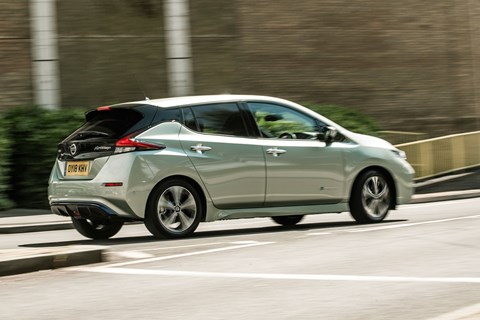
Still, I’ve already done an airport run and back driving like a normal human being at normal human being motorway speeds in one charge. I’ve also revelled in the instant torque delivery, which can make pulling away from traffic lights a quiet pleasure for the driver, and a shock for other drivers expecting it to be as slow as it looks. And I’m finding the amount of info displayed about your energy consumption, both in the car and in the Nissan EV Connect app, is mega handy.
Our electric car guide: advice, reviews and more
The Leaf’s e-Pedal is great for in town, too, though I’m struggling to see how it’s any different from most other battery-electric cars that have a heavy regeneration mode.
By Jake Groves
Logbook: Nissan Leaf Tekna
Price £28,390*
As tested £30,055**
Engine Electric motor, 148bhp @ 3283rpm, 236lb ft @ 0-3283rpm
Transmission Single-speed auto, front-wheel drive
Performance 7.9sec 0-62mph, 90mph, 168-mile range (WLTP claim), 0g/km CO2
Miles this month 972
Total 3062
Energy consumption 370Wh/mile
Fuel this month £32.40
Extra costs None
*Prices reduced by £2500 Plug-In Car Grant before November 2018 changes
Read more long-term test reviews by the CAR magazine team